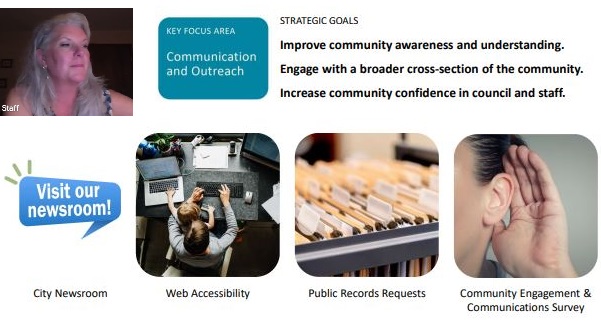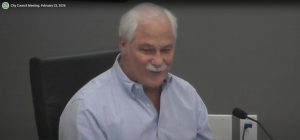City asks NLC for its vision of a future collaborative partnership
8 min read
Neighborhood board members citywide will come together Oct. 14. City planners will share the latest on housing, urban growth strategies, and survey results.
(From Eugene Office of Equity and Community Engagement, at NLC meeting Sept. 24, 2024)
Cindy Koehler (OECE): We are on Monday, Oct. 14 from 5:30 p.m. to 7:30 p.m. hosting a—it’s a casual conversation essentially, is what this is. It’s time for us to spend together with the city and with the neighborhood associations, ‘a fireside chat’ is what we’re calling it, but of course we don’t have a fireplace or anything fun like that so we’re going to fake it and put a fire on the big screen for a minute.
[00:00:44] We’re going to do these quarterly, and it’s like I said, it’s casual, so it’s an opportunity for the neighborhood boards to get together, share information and the agenda will be set based on the needs from the neighborhood associations.
[00:00:58] So Monday, Oct. 14, we’ll be talking about urban growth strategies and have a housing update from our folks in Planning and Development. For the last year, Planning and Development has been collecting data for the urban growth strategies. There’s been a number of surveys. They’ve gone to a number of your neighborhood events. They’ve done some intercept surveys. And now this information is going to Planning Commission and they will provide to those in attendance where we are in the process, what the next steps are.
[00:01:30] And they also felt it was a really good time to provide a housing update. We’ll be talking about housing production, affordability, housing choices, including middle housing and accessory dwelling units. So it’ll be a really interesting conversation with Planning and Development.
[00:01:47] So that’s coming up on Monday, Oct. 14. We’re asking people to register for the fireside chat just so we have general knowledge of who will be in attendance in person and who might want to join us online.
[00:01:58] Also, another update, we’ve got the Community Engagement Preferences Survey that’s out there. We’re really asking for the community to let us know how they currently receive information from the city, how they want to receive information from the city, and what works best.
[00:02:13] And then we break it down by the end of the demographic information we ask for people’s neighborhood associations. So the data we collect, we will also turn around and share with each of you so that you have that data and can know how the folks in your neighborhood associations would like to be communicated with. And there’s a whole list of options for people to choose from.
[00:02:32] John Q: She was asked about the budget gap.
[00:02:35] Cindy Koehler (OECE): So a lot has been talked about in the media, on our website, in our newsletters that go out, about the general fund budget gap.
[00:02:44] You know, I’ve been with the city for 27 years now and every few years we wind up with a budget gap and sometimes it’s a big one. And sometimes it’s one that’s not as big and we’re able to recover that just by dropping our materials and supplies budgets.
[00:02:59] So we’re now in, it’s a pretty big gap, it’s a pretty substantial gap. ‘Even with significant adjustments to the fund, an $8.3 million revenue placeholder is in the second year of the budget cycle as expenditures continue to outpace revenues.’
[00:03:13] So that’s where we are currently. If that’s of interest to you, I would encourage you to click on those links and take a look at the solutions that are being developed right now to resolve that budget gap.
[00:03:25] City Council was also presented with the progress report for the first year of Eugene Strategic Plan.
[00:03:30] John Q: Here’s background on that presentation.
[00:03:38] Jason Dedrick (Sept. 21, 2022): My name is Jason Dedrick. I am a policy analyst in the city manager’s office. And I’m here today to give you a presentation of these survey results that we have.
[00:03:48] Forty-one percent of our respondents believe that the value they’re receiving for their city tax dollars is below average or poor. And almost half of our respondents believe the direction that the city is taking is below average or poor.
[00:04:00] We asked in two separate questions, how respondents felt in terms of confidence in Eugene city council, when it comes to handling issues in the city. Not much or no confidence: 58% for council.
[00:04:10] John Q: Already facing a loss in confidence from 58%, the strategic plan focused on community engagement.
[00:04:22] Jason Dedrick (July 24, 2024): My name is Jason Dedrick in the city manager’s office and I’m here today to provide you with the first annual report on our 2023-2026 Strategic Plan.
[00:04:31] Our community survey—our first in quite some time—gave us a sense of what was on the community’s mind and what their priorities were. This helped inform a strategic planning retreat that occurred in the fall of 2022.
[00:04:43] One of the four key focus areas: communication and outreach. This isn’t just about us talking with the community about the work that we’re doing, but also fully engaging with the community, having them be able to participate in the work that we’re doing, and provide feedback on how we’re doing that work.
[00:05:00] There are three goals here: Improving community awareness; engaging with a broader cross-section of the community; and increasing confidence in council and staff.
[00:05:09] We launched the city newsroom, so we’re trying to get the word out to the community on all the great work that our staff are doing. This is really an important way to tell those stories to inform the community when the media landscape has really changed. And now it really needs to be the city, kind of, getting those stories out there.
[00:05:27] We also have been working really hard to meet and exceed federal web accessibility guidelines. Many of our community members are accessing information on the web. And so making sure that information is accessible to all community members is really important.
[00:05:42] The city received over 6,000 public records requests last year and recently have launched a new software portal program. An easier way for community members to submit those public records requests so that their experience of submitting it and tracking it is better. And it also makes things more efficient on the back end for staff, as we process those requests.
[00:06:05] And then finally, the Community Engagement and Communication Survey to better understand how they would like to receive information, how they would like to be engaged on city efforts.
[00:06:14] John Q: That was Jason Dedrick, with his July report on one key focus of the strategic plan, community outreach.
(Eugene Office of Equity and Community Engagement, Sept. 24, 2024)
[00:06:24] Cindy Koehler (OECE): You guys have heard me talk at length about the Eugene Strategic Plan and the four core areas of the strategic plan, which include community engagement; creating a culture of belonging; responding to urgent community needs—the three really core areas for the neighborhood associations and the neighborhood program.
[00:06:43] So the progress report is available online. You can take a look at the council meeting, and it talks about the Housing Implementation Pipeline and the Climate Action Plan 2.0 if you’re interested in that information. Also the safety payroll tax that was implemented, so lots of really great information in there.
[00:07:02] John Q: She gave an update on the neighborhood plans.
[00:07:05] Cindy Koehler (OECE): We are moving forward with the University Area and the Bethel area plans. We’re in the visioning stage, so we’re scheduling time with both areas. In the Bethel area,. we have Active Bethel Community, the Trainsong Neighbors, a little bit of the Industrial Corridor Neighborhood and a little bit of the West Eugene Community Organization, all included in that area plan.
[00:07:30] And in the University area, we have West University, South University, Amazon, and Fairmount Neighbors. So the visioning effort is a series of community meetings where we are focusing on specific topics that have come up through the initial conversations with the advisory committee and with the community groups.
[00:07:53] You can sign up for more information on those plans.
[00:07:55] River Road/Santa Clara plan, five years in the works: We now have the planning document. So now we’re working on: How do we implement that document? So we are going out to the community in both River Road and Santa Clara area, with their meetings, at their events, and asking the community members what they would like us to start working on.
[00:08:17] And by ‘us,’ I mean the collective us. It’s not the city doing all of this. It’s us as a group working on all these priorities together. We’re asking the community to prioritize.
[00:08:30] And we’re still in the collection, the data collection phase of that. So we went to the River Road Community Organization, the river fest, and then we’re also at the Transportation Fair at North Eugene High School that captured both Santa Clara and River Road folks.
[00:08:44] And then Downtown. We’ve got some transportation changes for downtown and of course downtown is the heart of the city. So these transportation changes impact all neighborhoods.
[00:08:57] And there’s a transportation fair where they will be talking about the different changes on Oct. 2 from 4:30 to 6:30 p.m. It’s a drop-in at the Eugene Public Library in the Bascom-Tykeson Room. And they’ll be talking about certain areas of downtown and some of the improvements that are proposed. So it’s an opportunity to provide some information or learn some information and provide some input on the process.
[00:09:18] John Q: She asked for charters by the end of October. The deadline is linked to the Neighborhood Organization Recognition Policy (NORP).
[00:09:27] Cindy Koehler (OECE): We have committed to mayor and council in the NORP. It’s actually listed in the NORP and in—or maybe it was in the resolution—that we would have the Charters to Mayor and Council to consider by Oct. 31 or that we would have them collected for Oct. 31. We are asking that everybody does everything they can to help meet that timeline.
[00:09:47] John Q: With her own question for neighborhood leaders:
[00:09:51] Cindy Koehler: I noticed on the agenda that there’s time allocated for looking forward. What are the goals or thoughts of the NLC in moving forward? And I wanted to know what, from your perspective, what does the collaboration partnership between the Neighborhood Leaders Council and the city look like to you all in the room? That would be really good for us to know.
[00:10:14] Also, I also wanted to ask, of the 18 active neighborhood associations, about two-thirds show up for NLC regularly and a third generally don’t. Is there a mechanism or a plan for bringing all of those folks into the council? It’s such a great opportunity for the neighborhoods to get together to share ideas. It’s a very structured environment to get together, share ideas, share challenges, and really talk through best practices and how to work together to really do great things in our community.
[00:10:54] So anyway, those are my two questions. I certainly don’t expect the answers right now, but hopefully that’s something you all will chew on for a little bit.
[00:11:02] John Q: The city asks neighborhood board members to register in advance for a casual conversation Oct. 14. And with state mandates and budget worries increasing, the city and NLC start talking about their collaborative partnership of the future.




